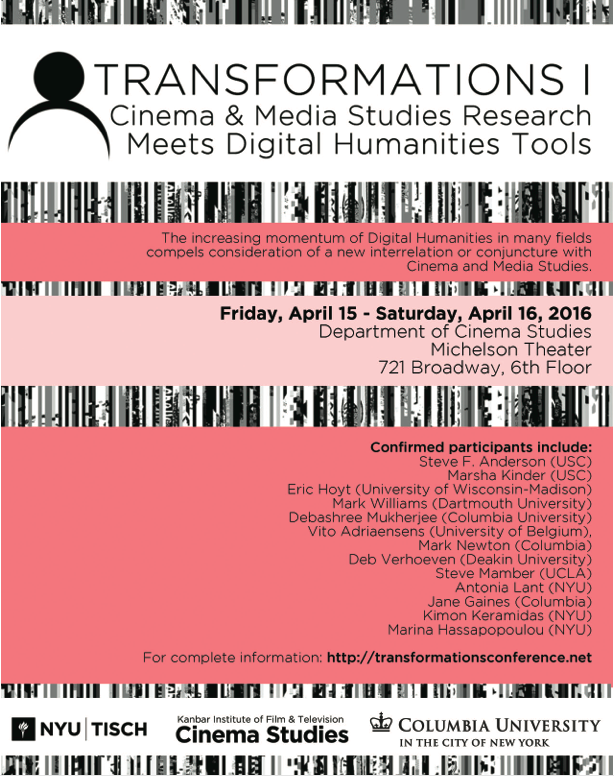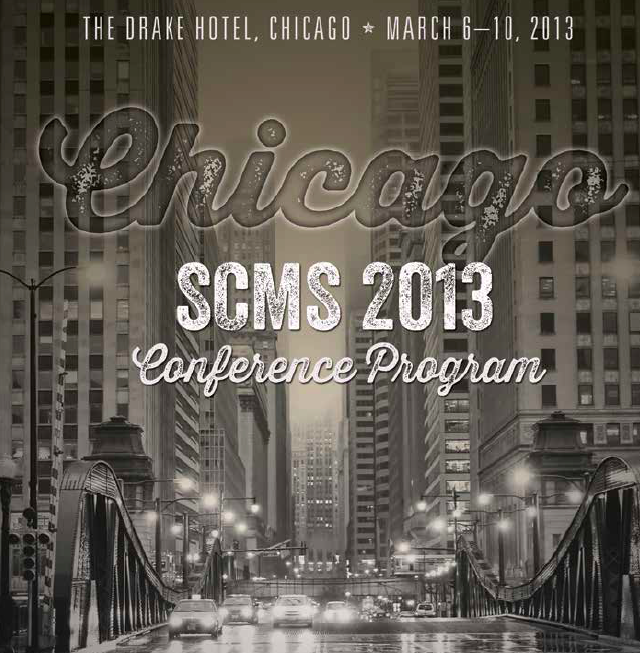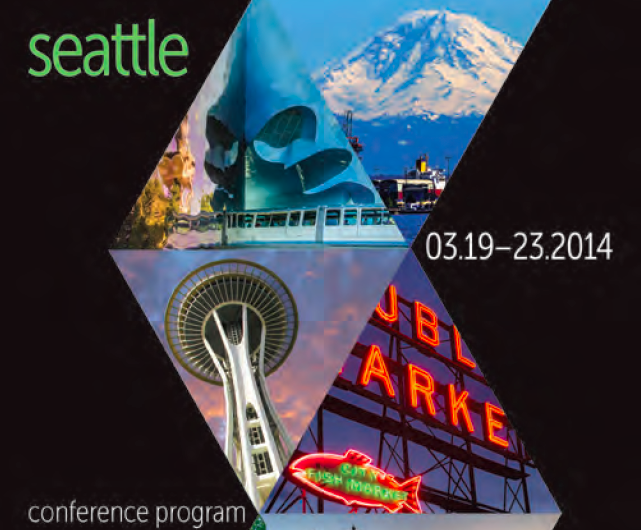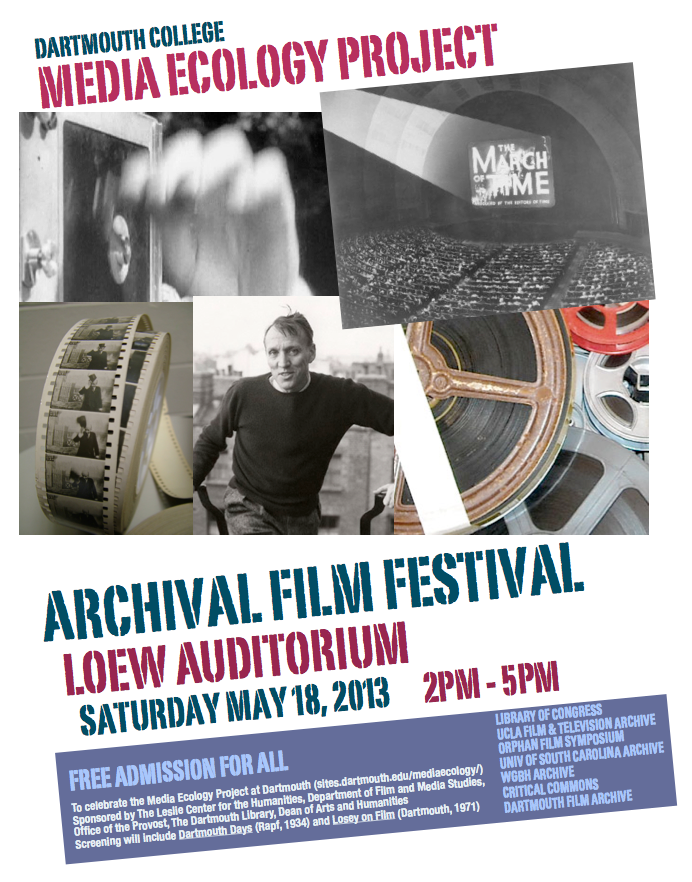Tranformations I (April, 2016)
Looking forward to participating in this amazing conference co-sponsored by NYU and Columbia University.


Looking forward to participating in this amazing conference co-sponsored by NYU and Columbia University.


Proud to announce we have received an NEH Tier 1 Research and Development Grant from the Office of Preservation and Access to build a Semantic Annotation Tool (SAT).
The two-year grant begins Jan 1, 2016, and is also supported by Dartmouth College in myriad ways.
Special continued thanks to The Department of Film and Media Studies, Deans of Faculty and of Arts and Humanities, The Committee for Scholarly Innovation and Advancement, The Office of the Provost, The Neukom Institute, The Leslie Center for the Humanities, The Dartmouth College Library, and Information Technology Services at Dartmouth! … NEH Research and Development Grant for MEP!
We are delighted to announce a pilot study in cooperation with The Films Division archive in Mumbai, India.
From the Films Division website:
“The Films Division of India was established in 1948 to articulate the energy of a newly independent nation. For more than six decades, the organization has relentlessly striven to maintain a record of the social, political and cultural imaginations and realities of the country on film. It has actively worked in encouraging and promoting a culture of film-making in India that respects individual vision and social commitment.
It is the main film-medium organization of the Government of India and is well equipped with trained film personnel, cameras, recording and editing facilities. This infrastructure is put to use to assist in- house as well as free-lance film makers and producers.
In its archives, the Films Division of India holds more than 8000 titles on documentaries, short films and animation films.”
In the next few posts we will be recapping some of the exciting developments for The Media Ecology Project in the year since we held our opening symposium at Dartmouth College. This is the third of five installments focusing on conference presentations about MEP in 2013-2014..
The 9th Orphan Film Symposium, hosted by NYU Cinema Studies, the EYE Institute, and the University of Amsterdam focused on The Future of Obsolescence, which presented a perfect opportunity to present MEP to an international community of archivists, academics, and artists from more than 30 countries. Orphanistas are committed to the discovery and preservation of what might otherwise be shunned and ignored historical media.
Mark Cooper (University of South Carolina), Karen Cariani (WGBH), and Mark Williams(Dartmouth) presented on a panel entitled “New Research Networks for Obsolete Media,” which was moderated by Scott Curtis (Northwestern University). The panel had been proposed as one of the initiatives of the MEP Symposium at Dartmouth in May, 2013.
This was the first Orphans Symposium hosted outside the U.S., and featured many memorable events and screenings, including a keynote address entitled “The Poetics of Obsolesence” by Thomas Elsaesser (University of Amsterdam).
Thanks as always to Orphans founder and congenial spirit Dan Streible (NYU), part of the MEP Symposium, who deserves a MacArthur Fellowship for his inestimable work to transform a bad object–orphaned media–into a powerful and inspired international movement. We are also extremely grateful to our gracious host: head curator at EYE, Giovanna Fossati, who is Professor of Film Heritage and Digital Film Culture at University of Amsterdam.
FYI, here a post about The Eye Institute’s commitment to leadership in digitisation and restoration of film history.
Thanks to Mac Simonson for his help with this post!

In the next few posts we will be recapping some of the exciting developments for The Media Ecology Project in the year since we held our opening symposium at Dartmouth College. This is the second of five installments focusing on conference presentations about MEP in 2013-2014.
The Society for Cinema and Media Studies conferences have been invaluable to The Media Ecology Project as opportunities for collegial and intellectual exchange. In March of 2013 we provided an overview of MEP and its intended architecture for a workshop entitled “Designing for Open Access.” Little did we expect that a raging Chicago snowstorm would delimit participation during this opening conference session, but Mark Williams was able to Skype in workshop chair Eric Hoyt (University of Wisconsin, Media History Digital Library) as he awaited the morning bus from Madison. James Steffen (Emory) helped to lead a spirited discussion of open access goals and the work it takes to sustain them. Hoyt also participated in the May 2013 symposium at Dartmouth, and is a most valued colleague and participant in MEP.

At the 2014 conference in Seattle, MEP was featured in a workshop entitled “The Televisual Archive: New Directions of Research and Access” which allowed us to introduce and promote two of our pilot projects that specifically demonstrate the usefulness of television archives for studying the history of the 20th century.
Excellent colleagues Mark Cooper (University of South Carolina) and Amelie Hastie (Amherst) discussed insights drawn from their experience in utilizing archives for original primary research. Especially notable was the participation of two essential resources from the U.S. television archive world: Karen Cariani from the WGBH Archive in Boston and Mark Quigley from the UCLA Film and Television Archive. Cooper had just finished serving as the Acting Director of the Moving Image Research Collection at The University of South Carolina. The MIRC, WGBH and UCLA Archives are central participating partners in MEP, especially regarding the News pilot project and the pilot devoted to augmenting study of the historic television series In the Life, which assays gay and lesbian life in the U.S.
In the next few posts we will be recapping some of the exciting developments for The Media Ecology Project in the year since we held our opening symposium at Dartmouth College. This is the first of five installments focusing on conference presentations about MEP in 2013-2014.
In November of 2013 we were honored and pleased to present a panel about The Media Ecology Project at the annual conference of The Association of Moving Image Archivists in Richmond, Virginia.
Dartmouth’s own Mark Williams chaired the proceedings, introducing the project to the assembled specialists in a panel discussion that focused on the goals of our project and the resources we have already assembled. Our esteemed panel members were MEP architect John Bell (University of Maine), Mike Mashon (Head of Moving Images for The Library of Congress), Jan-Christopher Horak (Director, UCLA Film and Television Archive), Karen Cariani(Director, WGBH Archive and Libraries in Boston), and Dan Streible (NYU, Orphans Film Symposium). … AMIA 2013 MEP Panel
Welcome back to our posts to this space!
We have been busy realizing the initiatives that arose in our symposium at Dartmouth College last May. We have contributed to several major developments in the busy world of media archives, developments which will be highlighted in upcoming posts on this site.
Here is a brief update about the core focus of our recent activities:
The notion of ecology is central to the project in several ways. Those of us who work on media history recognize that the materiality of historical media is fated. These historic media texts simply will not endure, but for the efforts to preserve and archive them.
In a fundamental sense this is a sustainability project: we are working to protect and ensure cultural memory in the form of historical media collections.
We have set out to connect media scholars with the historical archives they use in their academic work. We intend that the scholarship realized via MEP will support the essential work of media archives.
The specific platforms we have engaged and are working to bridge are 1) Mediathread, a classroom platform developed at Columbia University, that we are working to augment as a research platform; 2) Scalar, a digital publishing platform developed at The University of Southern California; and 3) onomy.org, a new online tool developed for MEP that will facilitate the creation of glossaries and controlled vocabularies that can be assigned to online media files.
The Media Ecology Project sits in between and in relation to these platforms and the participating archives, navigating the import, export, and production of metadata across archival content that has been engaged by a scholar or team of scholars. In this way we will expand the capacities for search and discovery within specific archives and in relation to other archives, in order to realize new forms of research, scholarship, and publication.
Media Ecology Project Symposium
May 17-18, 2013
Black Family Visual Arts Center
Dartmouth College
Friday, May 17
8:30am Breakfast (VAC 201)
9:00am Introductory Session (Loew Auditorium)
12:00pm convivial lunch (VAC 301)
1:00pm Metdata Roundtable (VAC 001)
2:00pm Q&A with Mediathread and Scalar Programmers (VAC 001)
2:50pm coffee break
3:00pm Break-Out Sessions (VAC 001, 109, 230)
4:00pm Reports from Break-Out Sessions (VAC 001)
5:00pm Reception, with Game Culture Conference (VAC lobby)
Saturday, May 18
8:30am Breakfast (VAC 201)
9:30am Synthesis Session (VAC 001)
12:00 mid-day break
2:00pm Archival Film Festival (Loew Auditorium)
5:00pm Symposium concludes
Invited Speakers for the symposium:
Mike Mashon, Library of Congress
Andrea Leigh, Library of Congress
Adrienne Garber, Columbia Univ [Mediathread]
Steve Anderson, Univ Southern California [Scalar]
Eric Hoyt, Univ Wisconsin [Media History Digital Library]
Dan Streible, NYU Orphan Film Symposium
Mark Quigley, UCLA Film and Television Archive
Mark Cooper, Univ South Carolina MIRC Archive
Karen Cariani, WGBH Archive
Jaime Combariza, Brown Univ [Center for Computing and Visualization]

The Archival Film Festival will serve as a capstone public celebration of The Media Ecology Project symposium at Dartmouth.
The festival will be Saturday, May 18 at 2-5pm in the Loew Auditorium of the Black Family Visual Arts Center at Dartmouth College.
The festival will feature materials from The Library of Congress, The UCLA Film and Television Archive, The Orphan Film Symposium, The University of South Carolina MIRC Archive, the WGBH Archive, Critical Commons, and our own Dartmouth Film Archive.
Among the films to be screened will be Dartmouth Days (Rapf, 1934), directed by alum godfather of film studies at Dartmouth Maurice Rapf, and Losey on Film (Fauer, 1971), a film made during alum Joseph Losey’s residency at Dartmouth in 1970.
Deep appreciation to The Leslie Center for the Humanities, The Office of the Provost, The Dartmouth Library, the Dean of Arts and Humanities, The Neukom Institute, and the Department of Film and Media Studies.
Hope to see you at the festival!